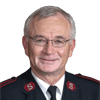Trying to measure a person's worth is not a new exercise. In 2008, Time magazine reported that a year of human life is worth $50,000 based on the standard used by international insurance programs. Most of us would resist the idea of measuring the value of a human being with a dollar amount—surely life is beyond price. There is, however, a serious side to this question.
At the recent World Religions Summit in Winnipeg (see report), Lt-General The Honourable Roméo Dallaire addressed the faith leaders that had gathered in conjunction with the much anticipated G8/G20 meetings hosted by the Government of Canada. In his speech, the retired military general and now Canadian senator asked: Are some humans more valuable than others?
In 1994, the general and his small United Nations peacekeeping group watched helplessly as hundreds of thousands of men, women and children were slaughtered mercilessly in the Rwandan genocide. The numbers were overwhelming—800,000 lives lost in just over 100 days. Millions of others were maimed and displaced from their homes. All the while, the developed world sat idly by and watched the massacre unfold or simply changed the TV channel.
The lessons are far-reaching. More than one billion people today live in abject poverty. The numbers are beyond comprehension, the issues are complex and the temptation is to adopt a fatalistic attitude. After all, what can one person do? That was the gist of the argument put forward by Bramwell Booth to his father, William, when confronted with the scores of homeless men sleeping rough under the stone bridges in the south of London, England. What followed is one of the Salvation Army Founder's most frequently quoted admonitions: “Do something! Bramwell, do something!”
Rather than throwing up our hands in despair, each of us can take steps now to positively impact the lives of others. Why? Because each person matters, whether they live in East Africa or the east end of Vancouver.
This theme is captured in Melissa Walter's article on three Army ministries to women on Canada's west coast (see Heart to God, Hand to Woman). Lisa, who was addicted to drugs, testifies to the power of prayer and the strength she discovered at the Homestead. “We learn that everyone has equal value and to live with everyone's best interests at heart,” she says.
 Major Jim Champ is Editor-in-Chief and Literary Secretary for The Salvation Army. He is also a member of the Governing Board of the Canadian Council of Churches.
Major Jim Champ is Editor-in-Chief and Literary Secretary for The Salvation Army. He is also a member of the Governing Board of the Canadian Council of Churches.
At the recent World Religions Summit in Winnipeg (see report), Lt-General The Honourable Roméo Dallaire addressed the faith leaders that had gathered in conjunction with the much anticipated G8/G20 meetings hosted by the Government of Canada. In his speech, the retired military general and now Canadian senator asked: Are some humans more valuable than others?
In 1994, the general and his small United Nations peacekeeping group watched helplessly as hundreds of thousands of men, women and children were slaughtered mercilessly in the Rwandan genocide. The numbers were overwhelming—800,000 lives lost in just over 100 days. Millions of others were maimed and displaced from their homes. All the while, the developed world sat idly by and watched the massacre unfold or simply changed the TV channel.
The lessons are far-reaching. More than one billion people today live in abject poverty. The numbers are beyond comprehension, the issues are complex and the temptation is to adopt a fatalistic attitude. After all, what can one person do? That was the gist of the argument put forward by Bramwell Booth to his father, William, when confronted with the scores of homeless men sleeping rough under the stone bridges in the south of London, England. What followed is one of the Salvation Army Founder's most frequently quoted admonitions: “Do something! Bramwell, do something!”
Rather than throwing up our hands in despair, each of us can take steps now to positively impact the lives of others. Why? Because each person matters, whether they live in East Africa or the east end of Vancouver.
This theme is captured in Melissa Walter's article on three Army ministries to women on Canada's west coast (see Heart to God, Hand to Woman). Lisa, who was addicted to drugs, testifies to the power of prayer and the strength she discovered at the Homestead. “We learn that everyone has equal value and to live with everyone's best interests at heart,” she says.
 Major Jim Champ is Editor-in-Chief and Literary Secretary for The Salvation Army. He is also a member of the Governing Board of the Canadian Council of Churches.
Major Jim Champ is Editor-in-Chief and Literary Secretary for The Salvation Army. He is also a member of the Governing Board of the Canadian Council of Churches.









Leave a Comment